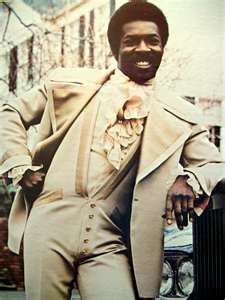Wilson Pickett
(March 18, 1941 – January 19, 2006)
A major figure in the development of American soul music, Pickett recorded over 50 songs which made the US R&B charts…
Pickett was born March 18, 1941 in Prattville, Alabama, he eventually left to live with his father in Detroit in 1955…
Pickett's forceful, passionate style of singing was developed in the church and, as a teenager and into his early twenties, on the streets of Detroit—Always under the influence of national recording stars such as Little Richard,
whom he later referred to as "the architect of rock and roll…
whom he later referred to as "the architect of rock and roll…
After singing for four years in a locally popular gospel-harmony group, Pickett, lured by the success of other gospel singers of the day, who left gospel music in the late 1950s for the more lucrative secular music market, joined the Falcons in 1959...
The Falcons were one of the first vocal groups to bring gospel into a popular context, thus paving the way for soul music. The Falcons also featured some notable members who went on to become major solo artists; when Pickett joined the group...
Eddie Floyd and Sir Mack Rice were also members of The Falcons....
Pickett's biggest success with The Falcons came in 1962, when "I Found a Love," (co-authored by Pickett and featuring his lead vocals)
Soon after the success 0f I Found a Love, Pickett recorded a demo for a song he co-wrote, called "If You Need Me." A slow-burning soul ballad featuring a spoken sermon, Pickett sent the demo to Jerry Wexler, a producer at Atlantic Records. Wexler heard the demo and gave it to one of the label's own recording artists, Solomon Burke...
Pickett's version of the song (with a bit more of a straight ahead, raw sound) was released on Double L Records, and was a moderate hit, peaking at #30 R&B, #64 pop.
In 1963, Pickett released his original composition, "It's Too Late," which entered the charts on July 27, 1963 and eventually peaked at #7 on the R&B chart (#49 Pop)
THEN, Wexler and Atlantic Records bought Pickett's recording contract from Double L Records…His first Atlantic releases were flops!!
Pickett's breakthrough came at the Atlantic subsidiary Stax Records' recording studio in Memphis, Tennessee, where he recorded his third Atlantic single, "In the Midnight Hour" (1965)
"In the Midnight Hour" was recorded on May 12, 1965, produced by Jerry Wexler with a powerful rhythm track provided by studio musicians Steve Cropper and Al Jackson of the Stax Records house band, which also included bassist Donald "Duck" Dunn.
(Stax keyboard player Booker T. Jones, who usually played with Dunn, Cropper and Jackson as Booker T. & the M.G.'s, did not play on any of the Pickett studio sessions.)
This song became Pickett's first big hit, peaking at #1 R&B, #21 pop (US), and #12 (UK). It sold over one million copies, was awarded a gold disc and put the Wicked Wilson Pickett at the top of the charts for years to come...
Pickett's partnership with Steve Cropper and Atlantic Records produced a long series of hits that included, "Don't Fight It" (1965)
"634-5789"(#13 in 1966)
"Land Of 1,000 Dances"(#6 in 1966)
("Land Of 1,000 Dances" is a rare example of a hit song that never mentions the title in the song's lyrics)
"Mustang Sally" (#23 in 1966)
"Funky Broadway" (#8 in 1967)
Pickett didn't confine himself to Atlantic's Stax division for long. Soon he was also cutting tracks at Muscle Shoals, where he recorded several early songs by Bobby Womack, as well as using Duane Allman as a session guitarist on a hit cover of the Beatles' "Hey Jude"
Soul Music faded from popularity in many places across the universe,
but Pickett didn't change, even though hits on the pop charts became harder to come by…
but Pickett didn't change, even though hits on the pop charts became harder to come by…
He did reach the top forty with "Engine Number 9" in 1970
"Don't Let The GreenGrass Fool You" in ’71
"Don't Knock My Love", a #1 R&B tune in 1971…
Check him out doing the tune on Soul Train…
Knock My Love proved to be his last Top 20 hit for Atlantic…
The impact of Pickett's songwriting and recording led to his 1991 induction into the Rock and Roll Hall of Fame...
In 1993, Wilson was convicted of drunk driving and sentenced to one year in jail after hitting an 86 year-old man with his car,
as well as being convicted of various drug offenses...
as well as being convicted of various drug offenses...
By 2005, Wilson Pickett was plagued by health problems and on January 19th, 2006, he suffered a fatal heart attack at the age of 64. He was buried in Louisville, Kentucky
R.I.P. WILSON PICKETT
THE USE OF ANY COPYRIGHTED MATERIAL IS USED UNDER THE GUIDELINES OF "FAIR USE" IN TITLE 17 & 107 OF THE UNITED STATES CODE. SUCH MATERIAL REMAINS THE COPYRIGHT OF THE ORIGINAL HOLDER AND IS USED HERE FOR THE PURPOSES OF EDUCATION, COMPARISON, AND CRITICISM ONLY. NO INFRINGEMENT OF COPYRIGHT IS INTENDED














No comments:
Post a Comment